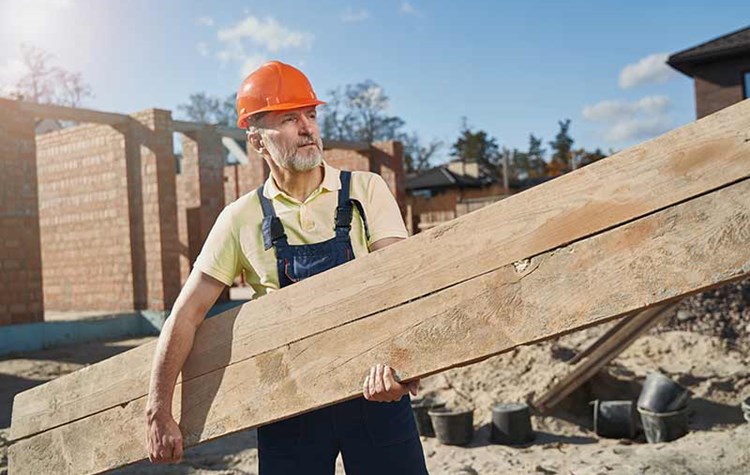Hernias are a common injury, especially for men in jobs that require a lot of lifting or physical activity, including tradespeople and those who play professional sports. They also tend to affect men more than women, so it’s important to get any symptoms checked out.
But don’t worry; despite the risk, you don’t have to give up the job or sport you love. Our guide below offers some tips to help you avoid developing a hernia and what to do if one forms.
What is a hernia?
A hernia occurs when an internal part of your body pushes through a tear in a muscle or tissue wall, usually in the abdomen or groin.
The most common type of hernia associated with physical overexertion is an inguinal (groin) hernia in men and femoral hernia in women. This happens when the intestines push through a tear in the inguinal canal in the groin.
What are the symptoms of a groin hernia?
Hernias may be asymptomatic but often you’ll notice a lump in your groin which comes and goes as you strain, a sudden onset of pain, difficulty passing wind or having a poo and, in some cases, vomiting.
Are hernias more common in men?
Men are more likely to develop a hernia, specifically an inguinal (groin) hernia, than women due to differences in anatomy. An inguinal hernia will affect nearly 25% of men and less than 2% of women over their lifetime (National Institutes of Health).
Why are inguinal hernias more common in men?
Men have a small hole in the muscles of the groin to allow for blood vessels to pass through to the testicles. This difference in anatomy makes men more susceptible to developing inguinal hernias than women. Women require strong lower abdominals to hold the uterus in place to carry children, so they have stronger inguinal area structures to keep all the muscle and tissue in place.
How to avoid developing a groin hernia in the workplace
If you work in a job that requires a lot of heavy lifting such as joinery, construction, floor/carpet laying, gardening or even in a factory if you move lots of heavy boxes, you can put a lot of strain on your body.
To avoid developing a hernia at work:
- Ensure that you’re aware of how to lift heavy objects. Your employer should provide manual handling training and the correct equipment to do the job. This can include lifting equipment or a stabilising belt to support your lower back
- Be careful when on site; avoid trips, slips or falls which could lead to a hernia
- Get treatment for any persistent cough, especially if it’s caused by dust or chemicals
- Take regular breaks and – if you can – do some gentle stretching
How to avoid developing a groin hernia from sport
Strengthen your core. Weak abdominal muscles are a key cause of developing a hernia whilst taking part in sport.
- Strengthen your core. Weak abdominal muscles are a key cause of developing a hernia
- Practice good form. Your gym instructor or personal trainer will be able to advise
- Take care when doing squats, deadlifts or weight-based abdominal exercises such as Russian twists, which can place a lot of pressure on your abdominal wall, even with a light weight
Other ways to avoid developing a groin hernia
- Lose weight if you’re overweight
- Avoid constipation, which can cause problems if you try to force a bowel movement, by eating plenty of fibre-rich foods and keeping hydrated
- Men – if you strain to urinate, this could be due to an enlarged prostate, make an appointment to see a GP for an assessment
When should I worry about hernia pain?
Hernias aren’t always painful when they first occur but, if not treated, the tear can grow over time and can lead to hernia incarceration or strangulation. This is when part of your intestine becomes trapped in the abdominal wall and loses its blood supply, putting your intestinal tissue at risk of dying. This can be life-threatening.
If you experience any of the following symptoms, you should seek immediate medical advice:
- The bulge becomes discoloured or darker than usual – usually red or purple
- The hernia becomes firmer, or more tender, or can’t be pushed back in
- You experience a sudden onset of pain, or the pain becomes worse
- You feel nauseous or vomit
- You have a high temperature
- You experience constipation or difficulty passing wind
How is a hernia treated?
Whether or not you need treatment depends on the size of your hernia and the severity of your symptoms. Your clinician will either monitor your hernia for possible complications or they’ll recommend laparoscopic hernia repair surgery.
At Benenden Hospital, our laparoscopic (keyhole) hernia repair surgery is performed by our expert Consultants as a day case procedure which involves pushing back the protruding tissue to repair the weak area of the abdominal wall. This area of the wall is often repaired with a patch of special mesh which is stitched into position during the operation. The mesh subsequently heals into the surrounding tissue, strengthening the wall and helping to prevent further hernias.
Mr Abuchi Okaro talks about hernia surgery at Benenden Hospital
Hernia treatment at Benenden Hospital
If you suspect you have a hernia, we offer fast access to diagnosis and treatment. Book a consultation with one of our experienced General Surgeons by completing our online booking form or by contacting our Private Patient team by phone on 01580 363158 or via Livechat.
Published on 18 April 2023







